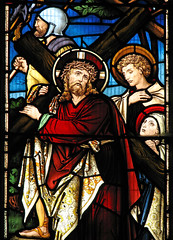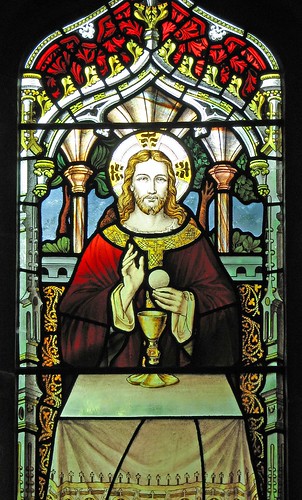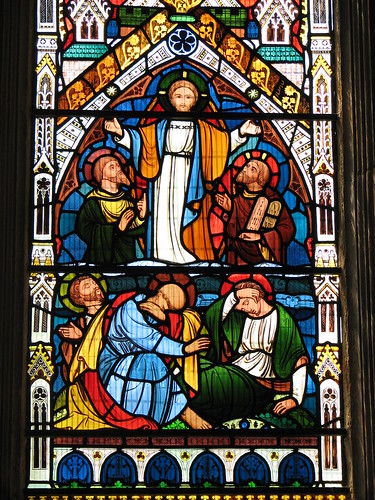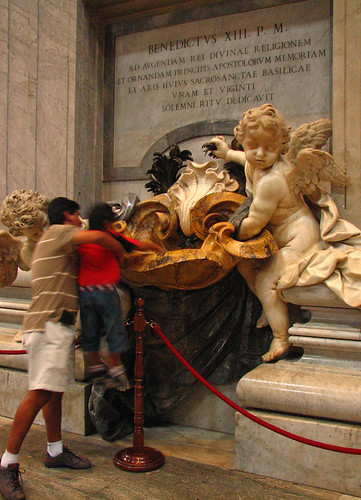The Annunciation: Luke 1:26-38
Last year when I participated in a liturgical preaching seminar at Oblate School of Theology in San Antonio Texas, one of my classmates, Barnabus Simitende O.M.I. was asked to prepare and preach a homily on the Feast of the Annunciation. As he began his homily, Barnabus, as loudly as he could, shouted 'Mary said yes'!!! Mary despite her trepidation said yes to the message of the angel, who had visited her with news of great joy. As we pray and meditate upon this mystery of the rosary, we too are called to listen and respond in faith to the message of the angel by saying YES! But what does it mean to say yes and what are we being called to accept in our lives of faith?
Recently, the B.B.C. has devoted much time to the subject of Dr. Rowan Williams' statement regarding Muslim Sharia law which has created a hornet’s nest of controversy in the Church of England, Downing Street, and among the general public, with many people calling for his resignation from office. Whether we agree or disagree with Dr. Williams' comments, he has raised our consciousness to the fact that we as a human community are living in an increasingly multi-cultural world, where tolerance alone is insufficient if we wish to bring about peace and justice in our relationships with people of different cultural and ethnic groups. As Catholic Christians, we, like Mary in the Annunciation scene, are called to accept the presence of the "other" in our lives as Mary did when she accepted the presence and the message of the angel. The Annunciation scene must have been both a strange and foreign experience for a fifteen-year old girl from Galilee, as is the presence of people from different cultures and races in London, Oxford, or elsewhere in the United Kingdom for many of us. It is important to remember that despite her trepidation, Mary welcomed the message of the angel because she was open to the action of God’s grace in her life. We, like Mary, are being invited during this Season of Lent to cooperate with the grace of God and the message of the angel, which calls us to welcome the stranger and foreigner in our midst, including our Muslim brothers and sisters.

According to Nostra Aetate, Vatican II's Declaration on the Relation of the Church to Non-Christian Religions, “In this age of ours, when men and women are drawing more closely together and the bonds of friendship between different peoples are being strengthened, the Church examines with great care the relation she has with non-Christian religions. Ever aware of her duty to foster unity and charity among individuals, and even among nations, she reflects at the outset on what the human community has in common and what tends to promote fellowship among them.” The reason for this is that “all humanity forms but one human community. This is so because all stem from the one stock which God created to people the entire earth (Acts 17:26) and also because all share a common destiny, namely God" (NA 1).
In light of the war, violence and terrorism which has and continues to contribute to the displacement of many thousands of people from their homelands in places such as Iraq, Afghanistan, Pakistan, Kenya and Darfur, people are seeking refuge, employment and safety across continents in order to provide a safe environment in which to raise their families. As we heard in Nostra Aetate we are one human family despite our religious differences because we are all created in the image of GOD and share a common destiny; God himself. Because we share this common destiny, we are challenged to respect the stranger and alien who is our neighbor. In the parable of Last Judgement (Matthew 25:40), Jesus emphasizes the importance of taking care of the stranger and alien in our midst as he tells us: "In truth I tell you, in so far as you did this to one of the least of these brothers of mine, you did it to me."
As we pray the rosary and meditate upon the mystery of the Annunciation during this Lenten Season, may we have the courage to ask ourselves some very tough questions: are we open to God's grace which calls us to accept the presence of the "other" in our midst and are we open to learning more about the faith of Islam, so that barriers of fear and hostility may give way to love, acceptance and hope for those who are seeking freedom from war, violence and oppression. May Mary our Mother guide and intercede for us as we seek to say YES to welcoming the stranger and alien in our midst.














 No more fear and hiding. Jesus is born into a human family and transforms the relationship within the family. But there is more. He transforms all human relationships as he brings hope into our world. We do not need to fear a stranger. Why is it? There is no real competition that we can now have among ourselves. It is Christ who is the cornerstone of the entire universe and all things relate directly to him. Both the stranger and we ourselves rely on the same hope. It is the same God who created us all, saved us and is looking out to see us coming back. If we accept this liberty there is no problem in calling Mary the Mother of God. This what she really is and this fact brings no threat to us. Neither does it influence in any negative way our personal hope for seeing God. We can still have a broadband access to God, even though Mary holds the hotline. No need to fear the Mother and the Child.
No more fear and hiding. Jesus is born into a human family and transforms the relationship within the family. But there is more. He transforms all human relationships as he brings hope into our world. We do not need to fear a stranger. Why is it? There is no real competition that we can now have among ourselves. It is Christ who is the cornerstone of the entire universe and all things relate directly to him. Both the stranger and we ourselves rely on the same hope. It is the same God who created us all, saved us and is looking out to see us coming back. If we accept this liberty there is no problem in calling Mary the Mother of God. This what she really is and this fact brings no threat to us. Neither does it influence in any negative way our personal hope for seeing God. We can still have a broadband access to God, even though Mary holds the hotline. No need to fear the Mother and the Child.



















